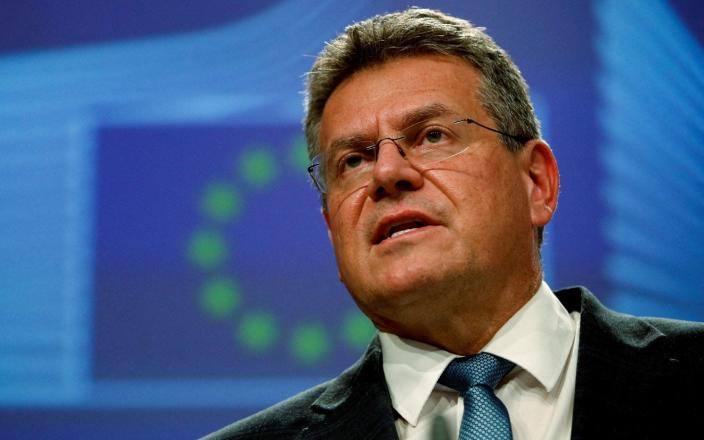
Brussels is ready to rip up a series of lucrative mini-deals with Britain if Boris Johnson presses ahead with a bonfire of EU red tape, the bloc’s chief Brexit negotiator has said.
Maros Sefcovic warned Number 10 that its plans to scrap hundreds, or even thousands, of European rules will threaten ties on data sharing, banking and food exports.
During a keynote speech to business leaders in London, he said that a wholesale departure from EU standards “will further deepen the barriers to trade” during a cost of living crisis.
Alongside the Brexit trade deal with the bloc, Britain has also struck a series of separate agreements to boost access to the European market for businesses.
They include a data adequacy pact which ensures the free flow of personal data which is crucial for many firms, especially those in the services sector.
There is also a deal on sales of organic food.
Meanwhile, Brussels has been stalling on implementing a promise to improve the currently limited access for City banks.
All three agreements are dependent on UK and EU rules being judged to be equivalent and can be pulled at short notice, with the Commission making the final judgment.
A 2020 report by University College London put the value of the data pact at up to £1.6 billion. British farmers sell £225 million of organic food to the bloc a year, according to the National Farmers’ Union.


Jacob Rees-Mogg, the efficiency minister, is set to publish a landmark Brexit Freedoms Bill next month which will set out plans to take advantage of leaving the bloc.
He has that said scrapping unnecessary Brussels red tape will help boost the UK economy and tackle inflation by easing the burden on businesses and leading to lower prices for goods.
The Government has pledged to cut £1 billion of EU-related costs on firms and has published a website so the public can track the repealing of up to 4,418 inherited laws.
Its plans are expected to include major breaks with Brussels rules in areas like banking and insurance regulation, gene-edited crops, data protection and the automotive sector.
However, Mr Sefcovic warned that the proposals are likely to prompt a strong response from the bloc, adding that the row over the Northern Ireland Protocol had heightened mistrust of the UK.
He told a Bloomberg event: “A long shadow being cast over our relationship in this way increases our vigilance including in relation to UK statements about ‘slashing EU regulation’, touted by some as a major benefit of Brexit.
“The UK is, of course, fully entitled to diverge from the EU if it wishes to do so. But this regulatory divergence has limits as well as consequences.
“For instance, in the area of financial services, data, and certain food products, the EU’s unilateral decision to grant market access is conditioned on the UK’s current regulatory framework.”
He added: “In other words, an end of mutual recognition is a possibility if the UK changes its standards. We will therefore be watching developments closely.
“But even where regulatory divergence is practically and legally possible, it will carry more cost and will further deepen the barriers to trade between the EU and the UK. Because more divergence means more friction and less trade – simple as that.”
Mr Sefcovic cited statistics that show Brexit is already dampening Britain’s trade with the Continent and said “at times of economic strain, this hurts businesses on both sides of the Channel”.
He also used his speech to call on the Prime Minister to “get Brexit done” and put an end to the Protocol row, accusing him of performing an “outright U-turn” on the deal he signed in 2019.
The EU negotiator dismissed the tabling this week of legislation to rip up Irish Sea border checks as “illegal” and said it has “put us back two years”, adding that Mr Johnson should show the “political courage” to agree a compromise.


He urged the UK to return to the table, but said any talks must not just be “window dressing” and that the bloc is “not going to negotiate when you have a gun on the table”.
“It is simply unrealistic and unfair for London to expect that all barriers can be lifted when goods move to Northern Ireland from the rest of the UK. On this, the UK Government needs to be honest at home and respectful vis-a-vis the EU,” he said.
“Zero checks is not an option. Checking everything is not practical. But making some minimal checks – yes, that’ll work.
“Given the strong economic headwinds and rising energy and food prices as well as inflation, this is surely the moment to abandon the chronic trend of non-implementation and unilateral surprises that has emerged from the UK side.”
Mr Sefcovic said co-operation between the UK and EU over the Ukraine war had shown how the two sides can work together and that “it is clearer than ever before that the EU and the UK are natural allies”.
He said: “In the current geopolitical environment, where the rules-based order is under pressure, strengthening Western unity should be our moral imperative. That includes strong, strategic EU-UK relations.”




